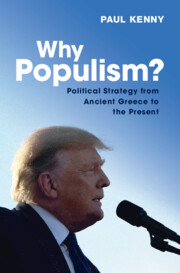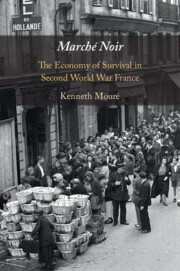Refine search
Actions for selected content:
26945 results in Economic history
1 - The Black Market in Wartime France
-
- Book:
- <i>Marché Noir</i>
- Published online:
- 16 March 2023
- Print publication:
- 23 March 2023, pp 1-18
-
- Chapter
- Export citation
6 - Consumers in a World of Scarce Goods
-
- Book:
- <i>Marché Noir</i>
- Published online:
- 16 March 2023
- Print publication:
- 23 March 2023, pp 127-172
-
- Chapter
- Export citation
Select Bibliography
-
- Book:
- <i>Marché Noir</i>
- Published online:
- 16 March 2023
- Print publication:
- 23 March 2023, pp 280-296
-
- Chapter
- Export citation
3 - Curing the Thermometer: Price Controls and the Black Market
-
- Book:
- <i>Marché Noir</i>
- Published online:
- 16 March 2023
- Print publication:
- 23 March 2023, pp 37-66
-
- Chapter
- Export citation
10 - Black Markets in Wartime
-
- Book:
- <i>Marché Noir</i>
- Published online:
- 16 March 2023
- Print publication:
- 23 March 2023, pp 264-279
-
- Chapter
- Export citation
4 - La terre, elle, ne ment pas: Agriculture and the Black Market
-
- Book:
- <i>Marché Noir</i>
- Published online:
- 16 March 2023
- Print publication:
- 23 March 2023, pp 67-95
-
- Chapter
- Export citation
8 - Liberating Markets and Consumers
-
- Book:
- <i>Marché Noir</i>
- Published online:
- 16 March 2023
- Print publication:
- 23 March 2023, pp 200-236
-
- Chapter
- Export citation
Abbreviations and Terms
-
- Book:
- <i>Marché Noir</i>
- Published online:
- 16 March 2023
- Print publication:
- 23 March 2023, pp xiii-xvi
-
- Chapter
- Export citation
Dedication
-
- Book:
- <i>Marché Noir</i>
- Published online:
- 16 March 2023
- Print publication:
- 23 March 2023, pp v-vi
-
- Chapter
- Export citation
5 - Market Forces: Industry and Commerce
-
- Book:
- <i>Marché Noir</i>
- Published online:
- 16 March 2023
- Print publication:
- 23 March 2023, pp 96-126
-
- Chapter
- Export citation
Copyright page
-
- Book:
- <i>Marché Noir</i>
- Published online:
- 16 March 2023
- Print publication:
- 23 March 2023, pp iv-iv
-
- Chapter
- Export citation
9 - Justice for les profiteurs de la misère publique
-
- Book:
- <i>Marché Noir</i>
- Published online:
- 16 March 2023
- Print publication:
- 23 March 2023, pp 237-263
-
- Chapter
- Export citation
Acknowledgments
-
- Book:
- <i>Marché Noir</i>
- Published online:
- 16 March 2023
- Print publication:
- 23 March 2023, pp x-xii
-
- Chapter
- Export citation
Tables
-
- Book:
- <i>Marché Noir</i>
- Published online:
- 16 March 2023
- Print publication:
- 23 March 2023, pp ix-ix
-
- Chapter
- Export citation
Figures
-
- Book:
- <i>Marché Noir</i>
- Published online:
- 16 March 2023
- Print publication:
- 23 March 2023, pp viii-viii
-
- Chapter
- Export citation
2 - L’économie de misère
-
- Book:
- <i>Marché Noir</i>
- Published online:
- 16 March 2023
- Print publication:
- 23 March 2023, pp 19-36
-
- Chapter
- Export citation
Contents
-
- Book:
- <i>Marché Noir</i>
- Published online:
- 16 March 2023
- Print publication:
- 23 March 2023, pp vii-vii
-
- Chapter
- Export citation
Index
-
- Book:
- <i>Marché Noir</i>
- Published online:
- 16 March 2023
- Print publication:
- 23 March 2023, pp 297-310
-
- Chapter
- Export citation

Why Populism?
- Political Strategy from Ancient Greece to the Present
-
- Published online:
- 17 March 2023
- Print publication:
- 06 April 2023

Marché Noir
- The Economy of Survival in Second World War France
-
- Published online:
- 16 March 2023
- Print publication:
- 23 March 2023
